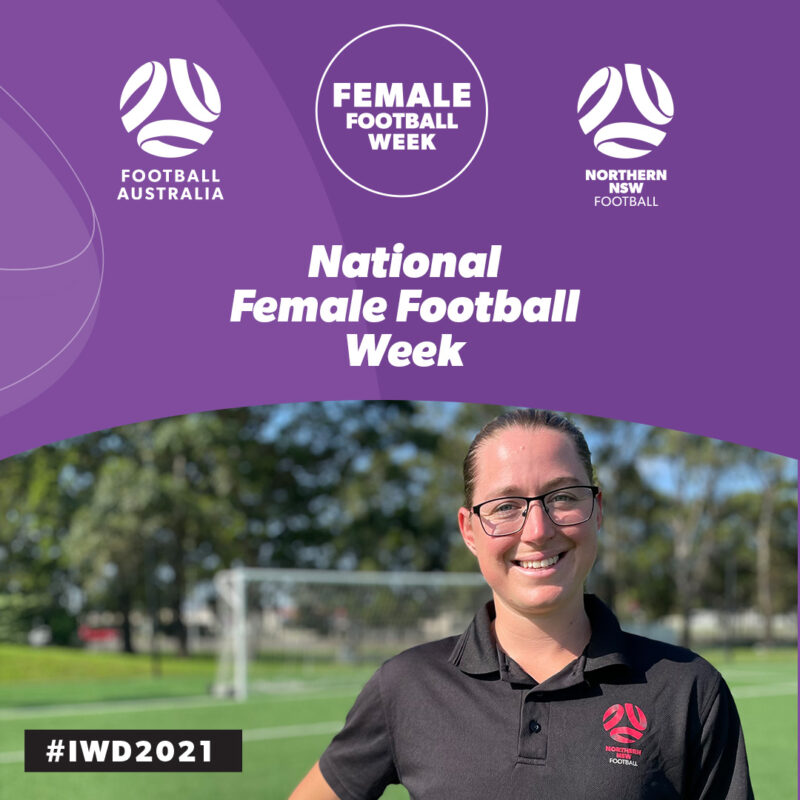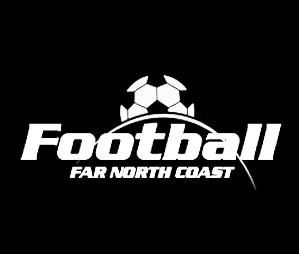Football has been a part of Annelise Rosnell for almost her entire life.
She has been a player, a referee and a coach. And is now making meaningful progress and change as well as creating opportunities for women and girls to be part of the game she loves.
Northern NSW Football is celebrating National Female Football Week this week, recognising the contribution of women and girls to the beautiful game across the region.
Rosnell joined Northern NSW Football two years ago before stepping into her Female Participation & Inclusion Officer role in March last year.
“My role focuses on creating and enhancing participation opportunities for women and girls, athletes with disabilities, Indigenous Australians and our multicultural communities,” Rosnell said.
“At the moment there is a heavy focus on women and girls with the 2023 FIFA Women’s World Cup on the horizon. It can be anything from educating club members and staff about inclusion for women and girls in football clubs to getting MiniRoos for Girls leagues off the ground and delivering our Kick-On for Women program.
“I love it. Growing up as a woman in football this is kind of the ideal job. I’m lucky getting to work on something I’m so passionate about.
“One of my favourite parts and the reason why I do this is giving opportunities to kids that I didn’t have growing up. Where I’m from didn’t have MiniRoos or youth girls’ only football. So I think that’s a really special thing about what we get to do is deliver things that weren’t around when I was a kid.”
Rosnell’s life in football started at the age of five as a player in the Clarence Valley region on the north coast of NSW thanks to her parents. It began a lifelong love of the game that also presented a number of challenges.

But it was enduring and overcoming these challenges that have made Rosnell so passionate about making progress and change for women and girls in football.
“I started playing when I was five-years-old, basically at the direction of my dad who was a footballer growing up. It was a family sport with both my older brothers playing as well,” Rosnell said.
“I played in mixed teams all the way up until I was 16 when I was old enough to play in a women’s team. The league that we were part of was a Coffs Harbour competition. So we travelled to Coffs Harbour every second week which was at least an hour and a half for an away game.
“North Coast Football now have a north and a south league. By growing the game in that space we are reducing barriers to participation by making sport more accessible. By creating opportunities for kids to play in girls only MiniRoos, if that’s what they want, you’re going to get girls growing up through the game.
“My first job growing up was as a referee. But there also wasn’t a lot of female match officials where I was from and that was a common theme from players that they didn’t want females refereeing their games. So that was pretty discouraging and was why I left that space.
“Coming to Newcastle I coached kids and adults through Northern NSW Football’s programs. And I coached a local football club’s under-10s team for a year and an All-Age women’s team at University of Newcastle for a year. And I’ve done my level 4 referee course.”
Rosnell is conscious that many other women and girls may have experienced the same challenges as her.
Which is why overcoming those obstacles and the perception of women in football held by some is so important to the work she is doing.
“Growing up playing in mixed teams there was definitely resistance from the opposition to treat us as equal players on the field,” Rosnell said.
“So it would always be frowned upon if you were challenged by a male player. That they would be shamed for tackling a girl or alternatively, they were teased for being ‘beaten by a girl’.
“There was the treatment of female players as inherently weaker than men. That was common as well which is obviously not true. There are some amazing female players and it would have created a different experience to have been treated equally.
“I feel like breaking down those barriers, the culture and this perception of girls in football is so important to what we do in creating positive experiences and opportunities.”
For Rosnell, her love of football comes down to a sense of community. The game has given her a simple way to connect with people as well as stay fit, happy and healthy, physically and mentally.
Football has been engrained in her life and helped her forge a number of lifelong friendships.
As for the future, Rosnell is positive and optimistic that the women’s game will only go from strength to strength as the sport enjoys more and more exposure.
“I think exposing the sport to a more diverse fan and player base is only going to strengthen the game, whether that’s women and girls or people from different backgrounds, athletes with disabilities, just creating more depth to the game, more people involved, more community,” Rosnell said.
“We’re in a good position. The fact we have a role like mine [at Northern NSW Football] where someone is here full-time to focus on the area of women and girls and inclusion is really important. We’re showing our commitment by having people in this space committed to doing the work.
“When you have people at our level that genuinely believe in what we’re doing it makes the biggest difference. And I think that’s why we’ll succeed because people genuinely care. Michelle Forbes running our Kick-On for Women program works because she genuinely cares about it. You need people who are invested in the change, to drive it, authentically.
“One of the best things is seeing a lot of the first women to do things, female referees in top tier men’s comps, female coaches leading teams in the elite space. I think that’s really cool being here at a time when we’re celebrating being the first women to do things.
“But I really look forward to the time when we don’t have to celebrate it. Women exist in that space and we don’t have to drum up excitement about it because it’s normal. Which is what we’re pushing for but to do that we have to celebrate. That’s probably my favourite thing, seeing other women succeed and breaking down some of those barriers and finding the small wins.”







